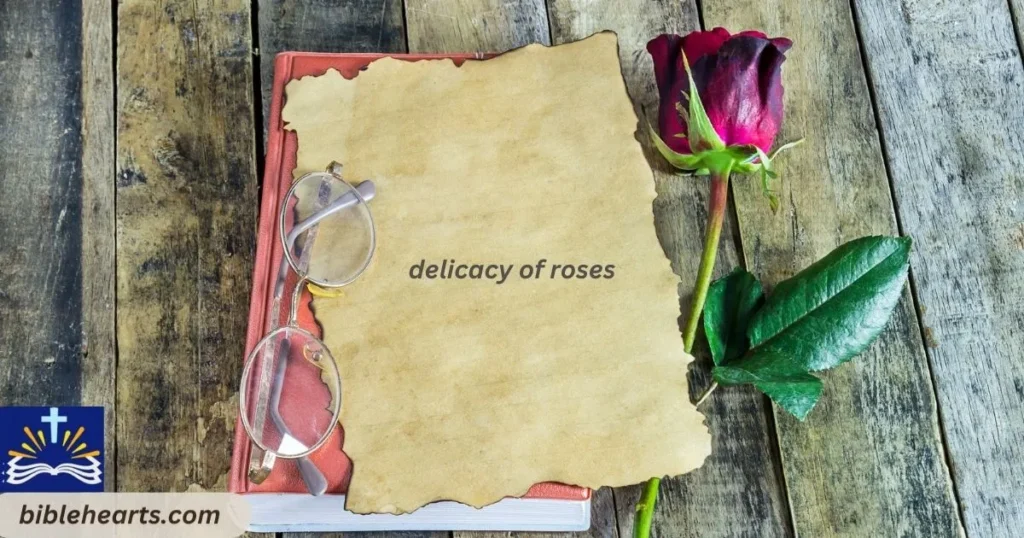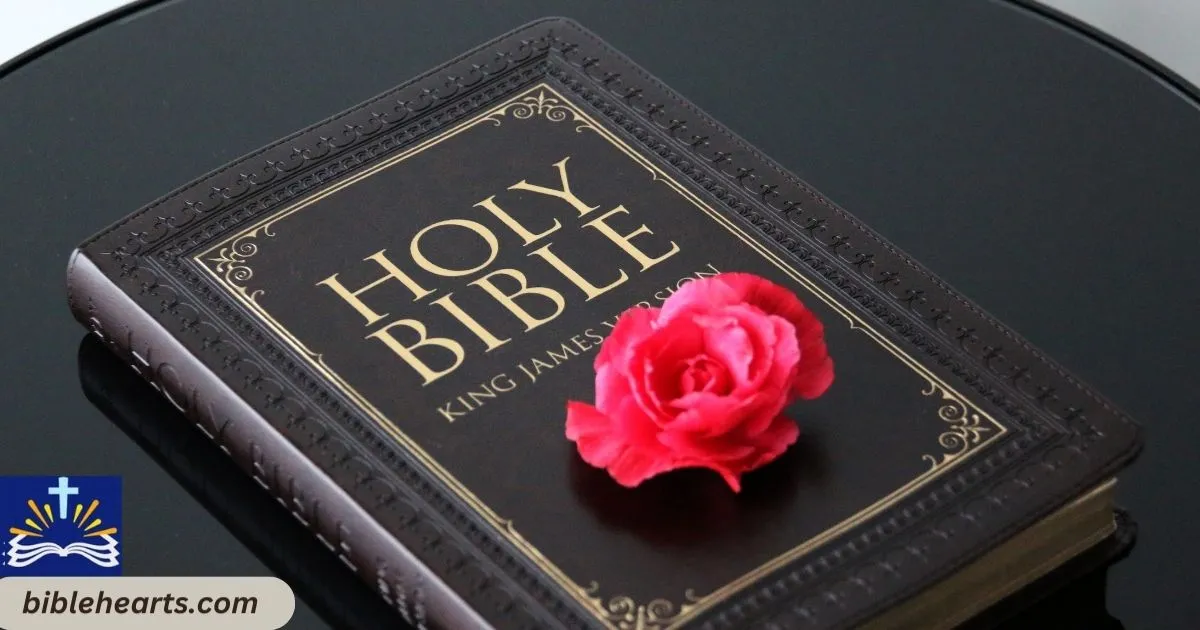“Roses in the Bible symbolize God’s beauty and love, showing the perfect harmony in His creation.”
Roses are often seen as symbols of beauty, love, and purity. In the Bible, they are used to convey deeper meanings, linking them to God’s creation and His love for humanity. Through the verses that mention roses, we can better understand the magnificence of God’s handiwork in the world around us.
While roses themselves are not often directly discussed in biblical texts, they appear symbolically and figuratively in ways that invite reflection on life, love, and mortality.This blog post delves into the Bible verses about roses, offering interpretations of how they reflect God’s creation, beauty, and the symbolism associated with them.
We will explore how these verses connect roses to the themes of God’s love, worship, prophetic imagery, and expressions of love.If you are looking to understand the deeper meanings behind these verses or simply appreciate the beauty of roses through a biblical lens, this post will guide you through the key scriptures that highlight their significance.
In this post, we will discuss specific Bible verses where roses are mentioned, drawing out their symbolic meanings and offering interpretations. From the Song of Solomon to Isaiah, roses appear in the sacred text in various forms, each representing something unique about God’s plan for creation. These verses will help you connect the beauty of roses with the divine nature of God’s love and His eternal message for humanity.
The Beauty of Roses
Song of Solomon 2:1
“I am the rose of Sharon, and the lily of the valleys.”
In this passage, the rose of Sharon is used as a metaphor for the beauty and purity of the beloved. Here, the rose is a symbol of divine love and beauty, showing how God’s love is fragrant, pure, and glorious. The mention of the rose in this verse emphasizes God’s perfect creation, filled with grace and splendor.
Isaiah 35:1
“The wilderness and the solitary place shall be glad for them; and the desert shall rejoice, and blossom as the rose.”
Isaiah uses the image of the rose blossoming in a desert to represent the transformation and beautification that occurs when God’s presence fills a barren place. The rose here symbolizes restoration and hope, showing that even in places of hardship, God’s grace can bring forth beauty and life.
Song of Solomon 2:2

“As the lily among thorns, so is my love among the daughters.”
This verse continues the metaphor of the beloved being like a flower among thorns, further highlighting purity, beauty, and love in a world full of challenges. The rose in this context emphasizes that true love, as expressed through God’s love, stands out in the midst of difficulties.
Hosea 14:5
“I will be as the dew unto Israel: he shall grow as the lily, and cast forth his roots as Lebanon.”
Here, roses are indirectly referenced as part of the metaphor describing Israel’s spiritual renewal. God’s nurturing love allows His people to flourish and grow, just as roses and lilies thrive in a healthy environment. The rose signifies growth, vitality, and flourishing through God’s grace.
1 Peter 1:24
“For all flesh is as grass, and all the glory of man as the flower of grass. The grass withers, and the flower thereof falls away.”
This verse reminds us of the temporary nature of human life in comparison to the eternal nature of God’s love. While roses and other flowers may fade, God’s love remains forever, underscoring the transient beauty of creation versus the everlasting beauty of God’s work.
Roses as Symbols of God’s Love
Song of Solomon 4:5
“Thy two breasts are like two young roes that are twins, which feed among the lilies.”
In this poetic verse, the love relationship is compared to the beauty and purity of roses and lilies. The love expressed here is intimate and deeply personal, just as God’s love for humanity is full of depth and tenderness.
Song of Solomon 5:13
“His cheeks are as a bed of spices, as sweet flowers: his lips like lilies, dropping sweet-smelling myrrh.”
The fragrance and beauty of flowers in this verse point to the sweetness of the lover’s presence. God’s love is sweet and irresistible, much like the scent of roses, signifying the grace and compassion that God offers to His people.
Isaiah 35:2
“It shall blossom abundantly, and rejoice even with joy and singing: the glory of Lebanon shall be given unto it, the excellency of Carmel and Sharon, they shall see the glory of the Lord, and the excellency of our God.”
The roses in this verse are symbols of joy and praise, reflecting the beauty that arises when God’s glory is revealed. The blossoming of flowers represents the manifestation of God’s love and power, bringing about beauty in the world.
Hosea 14:6
“They that dwell under his shadow shall return; they shall revive as the corn, and grow as the vine: the scent thereof shall be as the wine of Lebanon.”
This verse describes the spiritual revival that occurs when God’s love nurtures His people. The rose symbolizes the sweet fragrance of God’s presence and the new life that arises from being close to Him.
Isaiah 55:13
“Instead of the thorn shall come up the fir tree, and instead of the brier shall come up the myrtle tree: and it shall be to the Lord for a name, for an everlasting sign that shall not be cut off.”
In this passage, the thorn is replaced by the fir tree, symbolizing a change in spiritual condition. The new growth, like the blossoming of roses, signifies the redemption and restoration that God offers through His love and grace.
Roses in Worship and Praise
Psalm 103:15-16
“As for man, his days are as grass: as a flower of the field, so he flourisheth. For the wind passeth over it, and it is gone; and the place thereof shall know it no more.”
This passage highlights the fragility of life and the temporary nature of human existence, much like the fleeting beauty of roses. However, in contrast, the eternal nature of God’s love remains ever constant, even as roses fade.
Psalm 72:16
“There shall be a handful of corn in the earth upon the top of the mountains; the fruit thereof shall shake like Lebanon: and they of the city shall flourish like grass of the earth.”
The flourishing of roses and other plants in this verse symbolizes the abundance that comes from God’s blessings. It serves as a reminder of how God’s care and providence bring forth growth, beauty, and praise.
Psalm 92:12
“The righteous shall flourish like the palm tree: he shall grow like a cedar in Lebanon.”
Roses symbolize the flourishing of the righteous, who thrive under God’s care and grace. Like the roses that bloom in God’s creation, the righteous bear fruit and grow strong through His love.
Psalm 104:14
“He causeth the grass to grow for the cattle, and herb for the service of man: that he may bring forth food out of the earth.”
This verse speaks to God’s sustaining power over creation, providing for all living things. The growth of roses and other plants symbolizes the providence and care that God extends to all aspects of His creation.
Psalm 92:13-14
“Those that be planted in the house of the Lord shall flourish in the courts of our God. They shall still bring forth fruit in old age; they shall be fat and flourishing.”
Like roses planted in fertile soil, those who are rooted in God’s love will continue to grow and bear fruit throughout their lives.
Roses in Prophetic Imagery
Isaiah 35:1-2
“The wilderness and the solitary place shall be glad for them; and the desert shall rejoice, and blossom as the rose.”
Roses in this passage signify hope and restoration in places once barren. When God’s prophetic message is fulfilled, even the desolate places will bloom with the beauty of life, symbolized by the rose.
Hosea 14:7
“They that dwell under his shadow shall return; they shall revive as the corn, and grow as the vine: the scent thereof shall be as the wine of Lebanon.”
Roses represent revival and restoration in God’s prophecy. The flourishing of roses, along with other plants, symbolizes the renewed life and spiritual health that will come when God’s presence is felt.
Isaiah 41:19
“I will plant in the wilderness the cedar, the shittah tree, and the myrtle, and the oil tree; I will set in the desert the fir tree, and the pine, and the box tree together.”
This passage uses trees and flowers, including roses, to represent the spiritual transformation that will occur under God’s reign. Roses in this context symbolize the beauty and abundance that will follow in God’s new creation.
Isaiah 55:13
“Instead of the thorn shall come up the fir tree, and instead of the brier shall come up the myrtle tree: and it shall be to the Lord for a name, for an everlasting sign that shall not be cut off.”
Roses stand as a symbol of new growth and redemption, illustrating that where there was once struggle (thorns), there will now be beauty and grace (roses).
Isaiah 35:6-7
“Then shall the corny man leap as an hart, and the tongue of the reckless sing: for in the wilderness shall waters break out, and streams in the desert. And the parched ground shall become a pool, and the thirsty land springs of water.”
The imagery of roses blooming in a once-dry desert reflects the transformation that will occur when God’s promises are fulfilled. The dry land of spiritual emptiness becomes filled with beauty and grace, just as roses bring beauty to the earth.
Bible Verses About Seasons Changing in God’s Time
Roses in Parables and Teachings
Matthew 6:28-29
“And why take ye thought for raiment? Consider the lilies of the field, how they grow; they toil not, neither do they spin: And yet I say unto you, That even Solomon in all his glory was not arrayed like one of these.”
Here, Jesus uses flowers, including roses, as an example of God’s provision. The beauty of the flowers, which are cared for by God, teaches us to trust in His provision.
Luke 12:27
“Consider the lilies how they grow: they toil not, they spin not; and yet I say unto you, That Solomon in all his glory was not arrayed like one of these.”
Similar to the Matthew verse, this teaches the lesson of reliance on God for provision and beauty. Roses serve as a reminder of God’s perfect care for His creation.
John 12:24
“Verily, verily, I say unto you, Except a corn of wheat fall into the ground and die, it abideth alone: but if it die, it bringeth forth much fruit.”
This passage connects the death and resurrection of Jesus with the idea of renewal. Like a seed that grows into a beautiful flower, God’s love leads to new life and fruitfulness.
Matthew 13:23
“But he that received seed into the good ground is he that heareth the word, and understandeth it; which also beareth fruit, and bringeth forth, some a hundredfold, some sixty, some thirty.”
Roses, like good seeds, symbolize the fruitfulness that comes when God’s word is received and nurtured in our hearts. They signify the abundance that comes from living in alignment with God’s will.
Mark 4:8
“And other fell on good ground, and did yield fruit that sprang up and increased; and brought forth, some thirty, and some sixty, and some an hundred.”
In this verse, roses symbolize spiritual growth and fruitfulness. When the seed of God’s word is planted in fertile ground, it blooms into something beautiful.
Roses in Expressions of Love
Song of Solomon 2:16
“My beloved is mine, and I am his: he feedeth among the lilies.”
The love between the bride and groom is likened to the beauty of roses and lilies. The metaphor speaks to mutual love, intimacy, and the deep connection shared in the covenant of love.
Song of Solomon 4:5
“Thy two breasts are like two young roes that are twins, which feed among the lilies.”
This metaphor emphasizes the beauty and purity of the beloved, likening it to young roses and lilies that grow in purity and grace.
Proverbs 5:19

“Let her be as the loving hind and pleasant roe; let her breasts satisfy thee at all times; and be thou ravished always with her love.”
This passage emphasizes the beauty and delight found in love, symbolized by the delicacy of roses. It underscores the sacredness of love and its role in the relationship between such as spouses, partners.
1 Corinthians 13:4-7
“Love is patient, love is kind. It does not envy, it does not boast, it is not proud. It does not dishonor others, it is not self-seeking, it is not easily angered, it keeps no record of wrongs. Love does not delight in evil but rejoices with the truth. It always protects, always trusts, always hopes, always perseveres.”
These verses describe true love in its purest form, much like the delicate beauty of roses. Love, when expressed through patience and kindness, reflects the gentleness and beauty of God’s love for humanity.
John 15:13
“Greater love hath no man than this, that a man lay down his life for his friends.”
This ultimate expression of love mirrors the sacrifice that Jesus made for humanity. Roses, in their delicate beauty, are reminders of this selfless love that transcends all understanding.
Roses in Reflections on Mortality
Psalm 103:15-16
“As for man, his days are as grass: as a flower of the field, so he flourisheth. For the wind passeth over it, and it is gone; and the place thereof shall know it no more.”
This passage reminds us of the fragility of life, symbolized by the fleeting beauty of roses. Yet, it contrasts this with the eternity of God’s love, which remains unchanged.
James 1:10-11
“But the rich, in that he is made low: because as the flower of the grass he shall pass away. For the sun is no sooner risen with a burning heat, but it withereth the grass, and the flower thereof falleth, and the grace of the fashion of it perisheth: so also shall the rich man fade away in his ways.”
This passage reflects on the temporary nature of life, comparing it to the fading of roses. It reminds us of the importance of focusing on what is eternal—God’s love.
1 Peter 1:24
“For all flesh is as grass, and all the glory of man as the flower of grass. The grass withers, and the flower thereof falls away.”
Roses, like the flowers of the field, remind us of the brevity of human life, urging us to focus on the lasting beauty of God’s creation and His eternal kingdom.
Job 14:2
“He cometh forth like a flower, and is cut down: he fleeth also as a shadow, and continueth not.”
This verse highlights the shortness of human life, with the image of a flower that blooms and fades. It underscores the fragility of existence, but also the hope in God’s eternal love.
Isaiah 40:7-8
“The grass withereth, the flower fadeth: but the word of our God shall stand forever.”
This verse contrasts the fading flowers, like roses, with the eternity of God’s word. It teaches us that while life is temporary, God’s promises remain steadfast.
What Does the Bible Say About Roses Reflecting God’s Creation?
Roses, in the biblical context, reflect God’s beauty, grace, and divine love. They serve as symbols of hope, renewal, and the fragility of life, while also representing the everlasting nature of God’s love. These beautiful flowers in scripture highlight the harmony between creation and the Creator, pointing to the perfection found in God’s handiwork.
Key Insight
1. What do roses symbolize in the Bible?
Roses in the Bible often symbolize beauty, love, and God’s creation, reflecting His perfect design and care for us.
2. How does the Bible describe the beauty of roses?
The Bible compares the beauty of roses to God’s grace, showcasing their vibrant colors as a reflection of His glory.
3. What is the significance of roses in worship?
Roses represent God’s blessings and the beauty of nature, inspiring worship and praise for His creation.
4. How do roses appear in biblical parables?
Roses in biblical parables symbolize growth, purity, and the teachings of Jesus, often highlighting spiritual lessons.
5. Are roses mentioned in the context of mortality in the Bible?
Yes, roses are used to reflect the fleeting nature of life, reminding us of the brevity of time and the eternal nature of God’s love.
Conclusion:
The Bible uses the imagery of roses to reflect the beauty and wonder of God’s creation, teaching us about the fleeting nature of life, the eternal nature of God’s love, and the hope found in Him. Whether in the context of prophetic imagery, expressions of love, or reflections on mortality, roses remind us of God’s presence and care in our lives.
Through the verses that mention roses, we are invited to appreciate not only the beauty of these flowers but also the deeper truths they convey about God’s eternal love and perfect creation.

Hi! I’m Jane Austen, a classic novelist known for my keen observations on society and relationships, bringing timeless tales to life.










